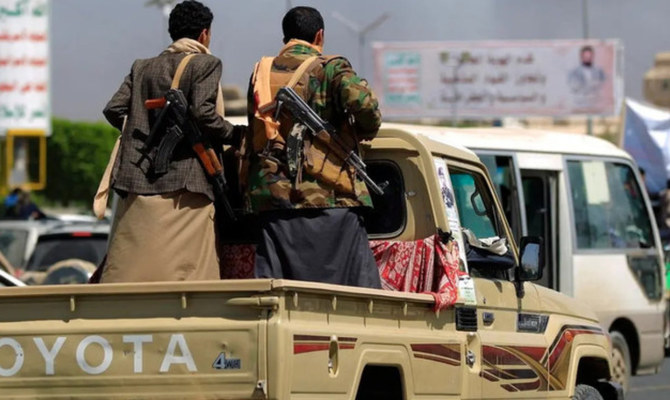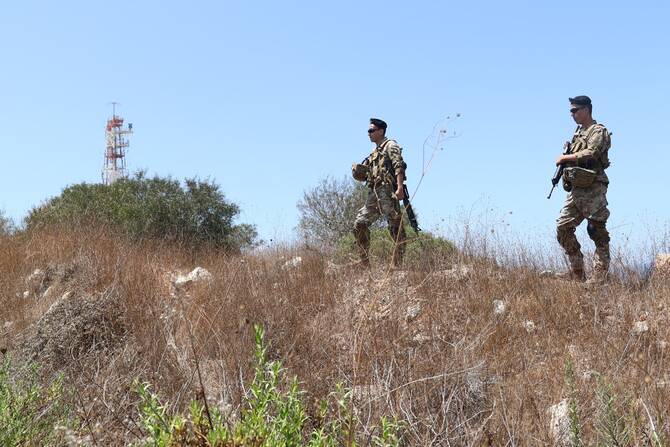AL-MUKALLA: Yemen’s Houthi militia claims to have launched a ballistic missile, which Israel intercepted on Monday as it approached its southern port city of Eilat, the latest in a string of missile and drone strikes on Israel and ships that the Houthis claim are in support of Palestine.
Houthi military spokesman Yahya Sarea said in a televised statement on Monday night that their missile forces launched a “new” ballistic missile called Palestine at a military site in Eilat in retaliation for Israel’s attacks on civilians in Rafah, claiming that the missile hit its target.
Earlier on Monday, the Israeli military triggered sirens in Eilat, sending inhabitants to shelters before intercepting a surface-to-surface missile from the Red Sea.
Since November, the Houthis have launched hundreds of ballistic missiles and drones against Israel, as well as ships tied to Israel or en route to Israel, in the Red Sea, Gulf of Aden, Indian Ocean, and, most recently the Mediterranean.
They also seized a commercial ship named Galaxy Leader at the start of their campaign and sank another, threatening to expand their operations to other waters if Israel did not cease its war in Gaza.
This comes as local and international organizations have increased pressure on the Houthis as well as sent appeals to the international community to put pressure on the Yemeni militia to stop the executions of scores of Yemenis.
On Saturday, a Houthi-run court in Sanaa condemned 44 individuals to death for “collaborating” with the Coalition to Restore Legitimacy in Yemen, sparking local and international condemnation of the group.
Adnan Ali Al-Harazi, a Yemeni businessman who runs a firm that assists aid groups in Yemen in authenticating the identities of aid recipients, was one of the Yemenis sentenced to death after being kidnapped by the Houthis in March of last year.
According to Yemeni lawyer Abdul Majeed Sabra, the 44 people were cruelly abused by the Houthis and held in separate cells for nine months, with no access to their relatives or medical treatment.
Yemen’s Human Rights Ministry accused the Houthis of torturing those kidnapped, as well as jeopardizing peace talks to end the war in Yemen and a new prisoner exchange deal.
“The terrorist Houthi militia continues to issue execution warrants for abducted citizens, which demonstrates to the world that it does not desire peace and an end to the conflict,” the ministry said.
The Mothers of Abductees Association, an umbrella organization for thousands of female relatives of civilian prisoners, also strongly condemned the death sentences imposed by the “illegitimate” Houthis in Sanaa, noting that those charged were abducted from their workplaces and homes and were tried with “false and fabricated” charges.
“We urge local and international authorities to act quickly to prevent these unjust rulings against the abducted people and spare them from imminent death,” the Yemeni organization said.
Similarly, the Geneva-based SAM Organization for Rights and Liberties accused the Houthis of using the courts in regions under their control to exact retribution on opponents, saying the Houthis abducted Al-Harazi and condemned him to death for exposing corruption cases involving Houthi officials.
“The Houthis must cease using the court system to settle scores and persecute their political opponents,” SAM said in a statement.
Meanwhile, Al-Masdar Online, a Yemeni news site, reported on Monday that a former Yemeni diplomat was killed while fighting alongside Russia in Ukraine, increasing the total number of Yemenis killed in the war in Ukraine to three.
The wife of Ahmed Al-Sahami, a former member of the Yemeni diplomatic mission in Russia until 2017, received a call alerting them of his death on the battlefield.
In May, the Yemeni Students Association in Moscow lamented the loss of Asaad Tareq Al-Kenani, a Yemeni student slain in Ukraine while fighting with the Russians.


























